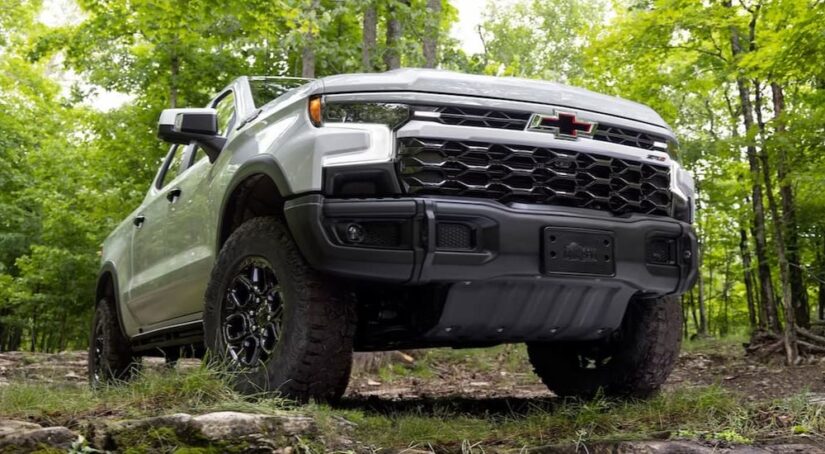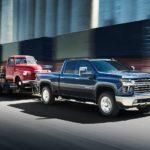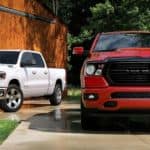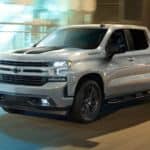If you’re headed to a Chevy dealer to custom order your next Silverado pickup, one choice you’ll have to make is what tires you want. Between the light-duty 1500 and the heavy-duty 2500 and 3500, there are a few different tire options. There is some overlap among the three, but only one has off-road tires. Whether you’re new to selecting tires or it’s simply been a while and you need a refresher, we’ll go over the different factory-installed tire options for the Silverado 1500, 2500, and 3500.
All-Season Tires
All-season tires are available on the 1500 and 2500. On the 1500, they are available in 17, 18, 20, and 22-inch varieties, so drivers can choose beefier tires on the 1500 and still enjoy all-season performance. The 2500 only has 17 and 18-inch all-season tires available. You’ll recognize all-season tires via their unobtrusive tread pattern. Their channels are relatively narrow, and the blocks don’t stick out much. They will have some light-biting edges to cut through mild snow and provide a good grip on dry and damp roads.
As their name suggests, all-season tires are good for year-round use. They can handle some wet roads and even light winter driving; however, they won’t be able to handle several inches of water or snow and should remain on paved roads. All-season tires are designed to be quiet and deliver the best fuel economy of the tires we’ll cover on this list.
Who Should Get All-Season Tires?
If you are using your truck primarily as an everyday driver for running errands, commuting to (paved) work sites, taking kids to school, and going about mild activities, all-season tires should do the trick. Their quiet design makes them appropriate for city streets, and the good fuel economy they provide shouldn’t land you at the gas pump too frequently. One caveat to consider with all-season tires: they’re only ideal if you live somewhere with moderate weather. If you live somewhere that gets several feet of snow each year and/or heavy rainfall, driving on all-season tires won’t provide the grip you need and could even be dangerous.
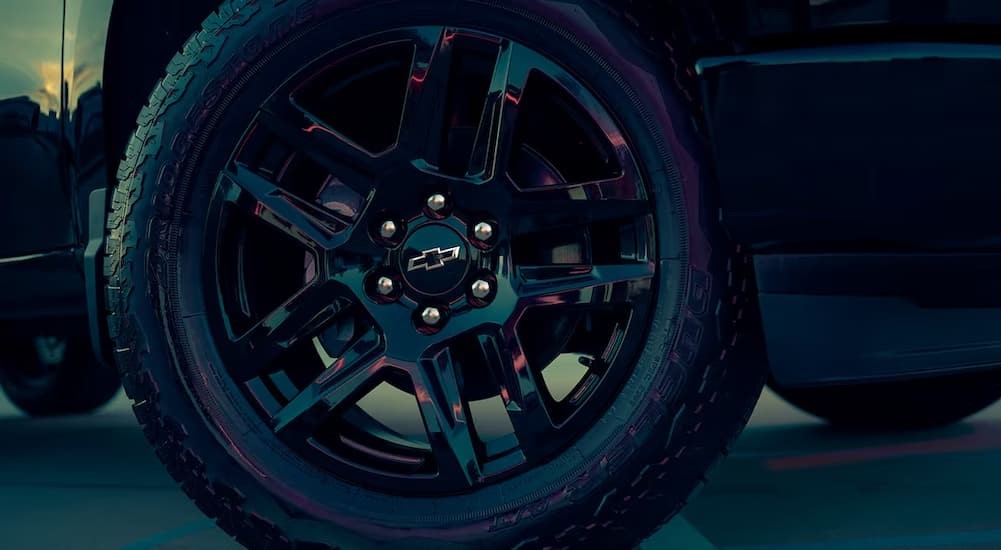
All-Terrain Tires
All-terrain tires are available on the 1500, 2500 and 3500. The 1500 has these tires available in 17, 18, and 20-inch varieties. The 2500 has them available in 17, 18, 20, and 22-inch varieties. The 3500, like the 1500, has these tires available in 17, 18, and 20-inch varieties. It makes sense that these types of tires are available across all truck models and in various sizes because they are some of the most versatile and popular tires. They do well on paved roads but can handle some unexpected roughness.
All-terrain tires are some of the most versatile tires. Some drivers say they combine the features of highway tires and mud tires. These tires have larger open tread blocks and voids on the shoulders to provide improved traction on muddy or snowy roads. These large tread blocks serve to channel mud and other debris away from the tires. They aren’t as aggressive in design as genuine mud-terrain tires, though, so they can handle paved, gravel, and dirt roads.
Who Should Get All-Terrain Tires?
If your day-to-day life has you spending equal amounts of time on paved roads and dirt or mud roads, consider all-terrain tires. These are popular tires among contractors who own their company and might not need to visit their job sites daily but pop in occasionally to check on their employees and the project’s progress. Alternatively, they can be good for those living in semi-rural areas, where you might drive on paved roads in town but take a long dirt road to get home. The nice thing about these tires is that they do well in most weather.
Mud Terrain Tires
Mud terrain tires are available on the 1500 and 2500 Silverado. The 3500 does not offer mud terrain tires. The 1500 offers 18 and 20-inch mud terrain tires, and the 2500 offers only 18-inch mud terrain tires.
Mud terrain tires have an aggressive tread design, with massive channels between the lugs and a noticeably large open-shoulder design. They’re made for off-road(ish) conditions. They can handle light snow, a decent amount of rain, mud (of course), gravel, rock and dirt. The only reason we add the (ish) is that there are dedicated off-road tires, which we’ll get to. Mud terrain tires won’t do great on paved roads. They will be very loud and will offer rather poor fuel economy.
Who Should Get Mud Terrain Tires?
If you live somewhere rural where paved roads are a rarity, mud terrain tires could work for you. They’re also a smart choice for someone whose truck will primarily remain at a work site and roll over bumpy, dirty, uneven ground daily. If this is your work truck that will remain mostly at job sites, and those job sites are rough, mud-terrain tires could be the right fit.
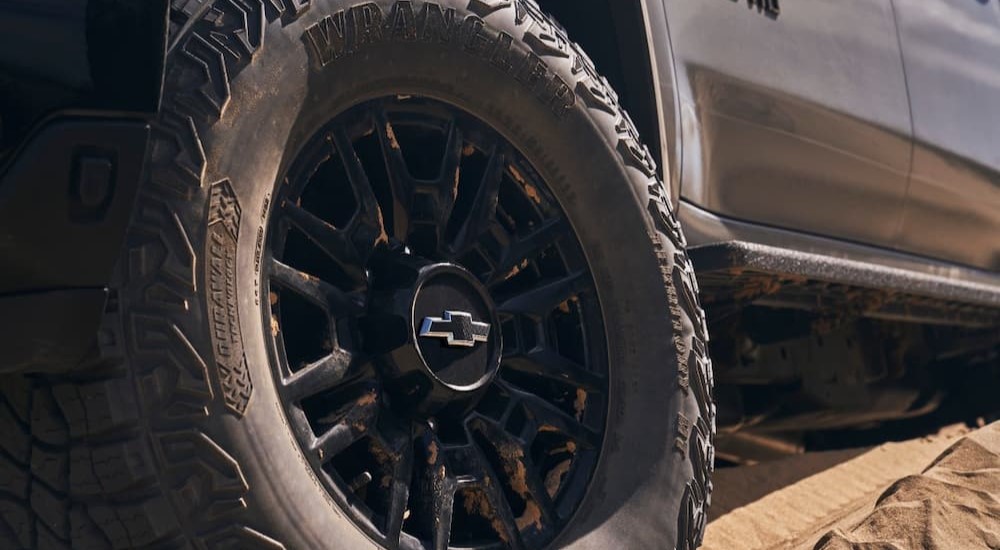
Off-Road Tires
Finally, we get to the off-road tires. Off-road tires are available only on the 2500 and 3500 and are only offered as 20-inch off-road tires. This is not surprising, seeing as drivers tend to select these heavy-duty trucks for more demanding environments rather than for driving around town. Off-road tires boast reinforced sidewalls and tread patterns that are made specifically to retain traction on uneven, muddy, dirt-littered surfaces. They can get you over rocks, boulders, sand, mud, snow, and just about any uneven surface.
Who Should Get Off-Road Tires?
While mud-terrain tires might be best for drivers who need to find themselves on uneven surfaces for work, off-road tires are for drivers who seek out the roughest terrain. Mud terrain tires can still go on paved roads (though they mostly shouldn’t), while off-road tires really have no place on paved roads. They will be incredibly loud and get very poor fuel economy. Off-road tires shine in off-road environments, and that’s that.
There’s a Tire for Every Type of Driver and Lifestyle
Hopefully, this has been a good rundown or refresher on the different tire types available across the Silverado family of pickups. It’s easy to overlook tire selection when designing your Silverado simply because there are so many other choices to make, like engine type, cab/bed configuration, trim, and beyond. But your tires will play a big role in your experience of your truck and its ability to do the things you need to do every day, so remember, proper research is key. They also impact fuel economy and safety, so be sure to get the best ones for your needs and habits. As a recap, here are the four tire types and who they’re best for:
- All-season: Good for everyday driving in normal conditions on paved roads and in mild to moderate weather.
- All-terrain: Good for some light snow and mud, but still equipped for paved roads.
- Mud terrain: Ready to tackle mud and dirt roads, as well as heavier snow. Should be kept mostly on dirt roads, but can go on paved roads sometimes.
- Off-road: Off-road tires should remain in off-road environments. They are designed specifically to help you maintain traction on mud, sand, dirt, snow, and other uneven surfaces.
